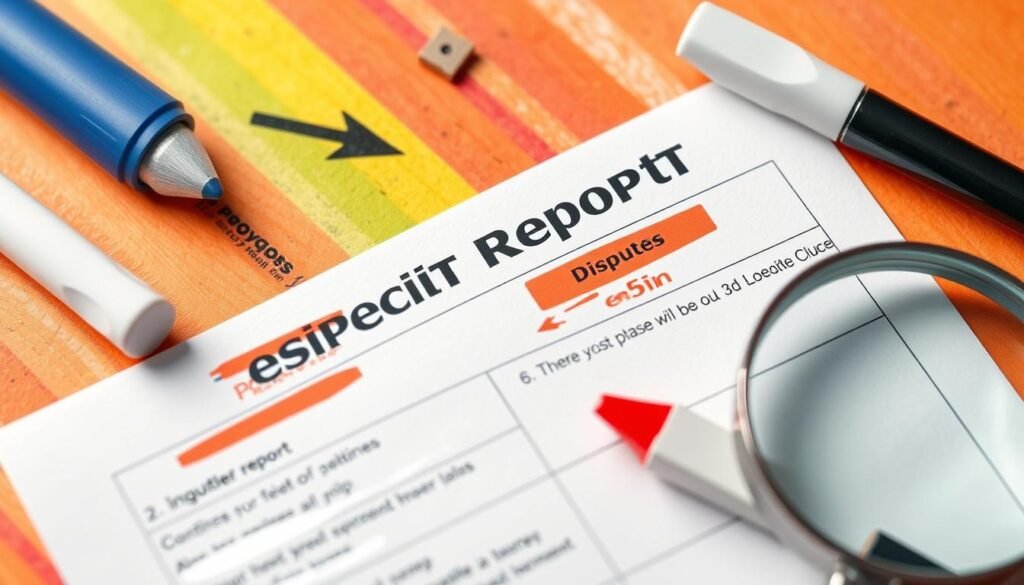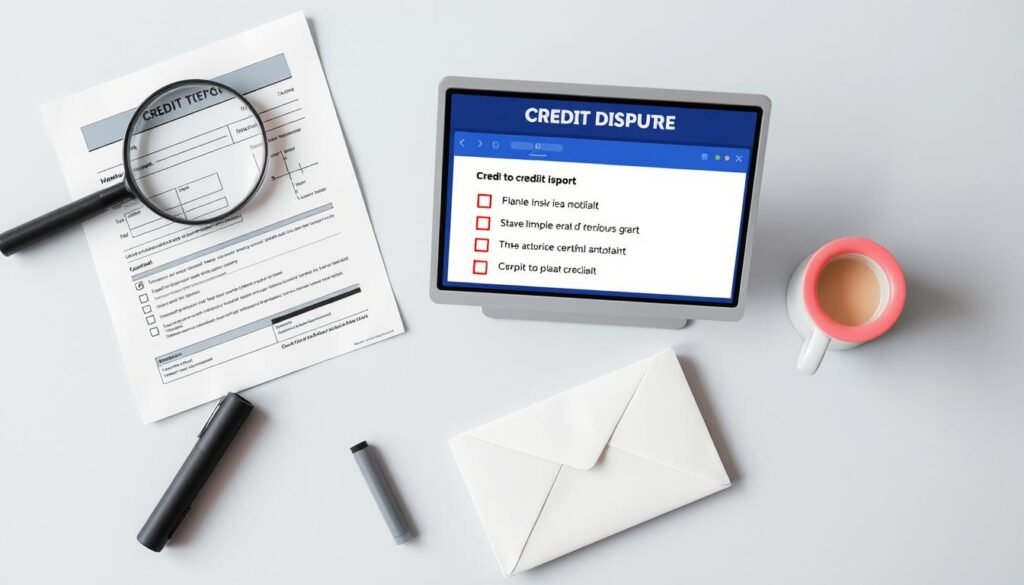Imagine holding your future but feeling held back by past financial mistakes. You’re not alone. Many work hard to fix their credit scores. The journey might seem tough, with many hurdles, but there’s hope. Every effort towards fixing these issues gets you closer to financial freedom.
Mistakes on your credit report or old negative marks need to go for a clean report. These errors happen more often than you’d think. For example, about 20% of people find mistakes on their credit reports, says the Consumer Financial Protection Bureau (CFPB). Fixing these errors is your right under the Fair Credit Reporting Act (FCRA), and it helps boost your credit score.
True negative marks will go away after seven years. But why wait, if you can correct mistakes sooner? By knowing your credit report and how to rightly dispute wrong info, you make big steps toward better financial health.
For a financial reset, start with your credit report. Knowing how to improve your credit score by disputing errors is crucial. This guide offers quick ways to remove negative marks. It makes you ready to fix inaccuracies. With hard work and the right tactics, a clean credit report can be your reality.
Table of Contents
ToggleKey Takeaways
- Dispute errors promptly to accelerate your credit score improvement.
- Accurate negative items will remain on your report for seven years.
- Errors can be deleted from your credit report; accurate information cannot be removed.
- The Fair Credit Reporting Act (FCRA) mandates correction of inaccurate information upon dispute.
- Regularly checking your credit reports helps identify and address errors quickly.
Understanding Negative Marks on Your Credit Report
Negative marks on your credit report can really hurt your credit score and opportunities. These marks might include late payments, bankruptcies, charge-offs, and collections. They stay on your report for different lengths of time. For instance, late payments and collections stay for about 7 years. Chapter 7 bankruptcies can stay for up to 10 years.
The Fair Credit Reporting Act (FCRA) says credit bureaus and lenders must report accurately. This is key in the credit dispute process to fix mistakes. Checking your credit regularly helps you find errors early. Items like late payments stay on for 7 years.
Late payments are reported when they’re at least 30 days overdue. Charge-offs happen after 180 days. Things like repossessions and student loan defaults also stay for 7 years. But, tax liens can remain for up to 10 years. It’s vital to know this for planning to remove bad credit history.
For those trying to remove negative credit history, it’s crucial to know how they affect scores. People with high scores may see a big drop from negative marks. Payment history is very important in credit scoring models.

| Negative Mark | Duration on Credit Report |
|---|---|
| Missed Payments | 7 years |
| Account Charge-offs | 7 years |
| Repossessions | 7 years |
| Collections Accounts | 7 years |
| Student Loan Defaults | 7 years |
| Chapter 7 Bankruptcy | 10 years |
| Chapter 13 Bankruptcy | 7 years |
| Foreclosures | 7 years |
| Hard Inquiries | 2 years |
| Federal Tax Liens | 10 years |
Keeping an eye on your credit report and knowing these periods is key. By making sure your report is accurate, you can manage your score and future better.
How to Identify Errors in Your Credit Report
Finding errors on your credit report quickly is key to keeping your score right. Common mistakes include misreported payments and incorrect account details. Duplicate entries can also hurt your financial health.

Common Credit Report Errors
Here are mistakes to look out for on your credit report:
- Payments that were on time but marked late
- Accounts wrongly listed as open when they’re closed
- Duplicate listings for the same debt
- Wrong personal information
- Accounts that aren’t yours
Checking Your Credit Report Regularly
It’s vital to check your credit report often. You can get free reports from Experian, Equifax, and TransUnion every 12 months. Plus, you can now check your report weekly for free at AnnualCreditReport.com.
Obtaining Free Weekly Credit Reports
Thanks to a new policy, you can get 6 free credit reports a year from Equifax until 2026. Using these opportunities helps you find and fix mistakes quickly. This keeps your credit report accurate.
Watching your credit report closely allows fast dispute of any errors. This is crucial for maintaining a healthy credit score. By doing so, you can avoid unfair negative marks.
Steps to Dispute Incorrect Information on Your Credit Report
Disputing wrong info on your credit report is a step-by-step process. It makes sure mistakes are fixed. This is key for getting loans and good interest rates. Let’s look at what you need to do.
Filing a Dispute with Credit Reporting Agencies
To begin, file a dispute with the big credit reporting agencies: Experian, Equifax, and TransUnion. You can do this online or through mail. For instance, disputing with Equifax is free and you get results in 30 days.
After you file, keep track of any confirmation codes. Equifax gives you a 10-digit code to help with this. Agencies must look into your dispute within 30 to 45 days, as the law says. To find out more, check the Consumer Financial Protection Bureau’s website.
How to Write a Dispute Letter
A well-written dispute letter is crucial. Include your name, address, and Social Security number. Say clearly what info you think is wrong and why, with lots of specifics.
Only send copies of documents that back up your claim, not the originals. For example, if something was marked late but wasn’t, show proof of on-time payments. Keep your letter clear and straightforward to avoid confusion.
Supporting Documentation for Your Dispute

- Valid driver’s licenses
- Birth certificates
- Utility bills
- Bank statements
- Letters from lenders
- Bankruptcy schedules
These documents prove your case and improve your chances of winning the dispute. For serious issues like identity theft or wrong death reports, strong proof is vital. The Federal Trade Commission insists on fixing such errors with the right documents.
By taking these steps and providing all needed documents, you boost your success chances. Working with a credit repair agency and understanding the dispute process helps fix your credit report and score.
How to Remove Negative Items from Credit Report Yourself
Working on your credit can make a big difference in your financial health. Learning to remove negative items on your own is a great first step. This self-repair effort can boost your credit score.
Gathering Necessary Documentation
Start with collecting all the needed documents. This includes statements, identity proof, and communications about the items you dispute. Having the right documents is essential for backing up your claim and making the process smoother.
Contacting Credit Agencies Directly
With your documents ready, reach out to the credit agencies to dispute errors. The Fair Credit Reporting Act (FCRA) requires them to check these disputes within 30 days, sometimes up to 45 days. Disputes can be made online, by mail, or phone. Be clear and provide all the needed evidence.
Following Up On Your Disputes
Staying on top of your dispute is key. Keep all correspondence and make sure the bureaus do their part. They must report back within 5 days after they finish the investigation. If they find mistakes, those have to be removed.
By keeping up with disputes and using your rights, you can clear negative items from your report. This boosts your score and lays a solid ground for your future credit health. Being proactive here means better financial health down the road, with more manageable credit use and on-time payments.
Hiring Credit Repair Services for Negative Credit History Removal
When your credit history needs serious help, professional credit repair services can be a game-changer. They have the know-how and tools to fix mistakes effectively. Choosing the right credit repair service involves a few critical steps.
Evaluating Credit Repair Companies
It’s essential to check a credit repair service’s credibility and history before hiring them. Consider these important factors:
- Reputation: Look at feedback from past clients. Seek out reviews that discuss their efficiency and how well they treat customers.
- Service Offerings: Check what services they provide. They should help with everything from disputing errors to protecting your identity.
- Pricing: Know their fees, including any setup charges. Credit Saint’s charges range from $79.99 to $139.99 monthly, plus up to a $195 setup fee. Credit Versio starts from $24.95 to $29.95, with no setup fees.
- Money-Back Guarantee: See if there’s a guarantee. Credit Saint offers a 90-day money-back guarantee, which is reassuring if you’re not satisfied.
Looking at these points can help you weed out bad services. Then, you can find a company that’s both trustworthy and effective.
Understanding Credit Repair Services Regulations
The Credit Repair Organizations Act (CROA) sets important rules for companies like Credit Saint or Credit Versio. These rules protect you, the consumer. They include:
- They must give you a detailed contract that explains your rights and what they’ll do for you.
- They can’t ask for payment before they’ve done their work.
- You get a three-day period to cancel the service without a penalty.
- You should receive regular, detailed updates about your credit dispute’s progress.
Knowing these rules helps you stay informed. It ensures you pick a credit repair service that follows the law and ethical guidelines.
| Company | Monthly Fee Range | Setup Fee | Money-Back Guarantee | Key Features |
|---|---|---|---|---|
| Credit Saint | $79.99 – $139.99 | $99 – $195 | 90 days | Credit and identity theft monitoring (premium plan) |
| Credit Versio | $24.95 – $29.95 | None | None | Monthly 3-Bureau reports & scores |
| The Credit People | $99 – $119 or $599 flat rate (6 months) | $19 | 6-month satisfaction guarantee | Cancel any time for prorated refund |
| Sky Blue Credit Repair | $79 – $119 (individuals); $119 – $179 (couples) | $79 – $99 | 90 days | Up to 15 items repaired every 35 days |
By considering various aspects, you can find the best credit repair service for your needs. A good service will resolve your credit report issues efficiently.
Other Strategies for Credit Restoration and Score Improvement
To better your credit score, try more than just fixing errors. You can also work on building a strong credit history. This will help improve your credit health overall.
Goodwill Deletions and Pay for Delete
Think about goodwill deletions and pay for delete arrangements. Goodwill deletions help erase minor negative marks. You write to your creditor, explain your situation, and highlight your good payment history.
With pay for delete, you pay off a debt to remove the negative mark. While it’s not always a sure thing, it can really help better your credit score.
Building Positive Credit History
Building a good credit history is key. Paying your debts on time is crucial—it influences 35% of your FICO Score. Aiming to keep your credit usage under 30% is also important. It affects another 30% of your score.
Opening too many credit cards can lower your score, especially if your credit history isn’t long. Your recent good payment habits will gradually improve your credit over bad items. Try your best not to miss payments, even by a few days.
Setting Up Alerts and Monitoring Your Credit
Setting up alerts and monitoring your credit can help keep an eye on your credit health. Regular checks let you catch and address any unusual activities quickly. This can protect and even boost your credit score over time.
You can get free credit reports once every 12 months from each credit bureau. Plus, you can check your report weekly for free until 2026 from the nationwide agencies. For tips on removing negative marks, look at this guide.
Conclusion
Boosting your credit score requires hard work, attention, and smart planning. Negative items like late payments, bankruptcies, and more can harm your financial standing. These issues can make getting new credit tough and cause higher interest rates, costing up to $100,000 extra.
Agencies like Equifax, Experian, and TransUnion offer a free credit report every year. Now, they provide free weekly reports online due to COVID-19. Make sure to check your credit report often and fix any mistakes quickly. Credit bureaus must correct errors within 30 days after a dispute is filed.
Remember, different negative items can stay on your report for up to seven to 15 years. To repair your credit, try goodwill deletions or set up monitoring. If needed, professional credit repair services can help, but they must follow the law. Being proactive and knowledgeable helps you remove negative marks, lift your credit score, and secure your financial future.
FAQ
What are some quick ways to improve my credit score and clean my credit report?
To boost your credit score and clean your report, pay off any debts. Always make payments on time. Dispute any errors you find and try to lower your credit card balances.
What do negative marks on my credit report mean?
Negative marks signal past credit mishaps like late payments or bankruptcies. They lower your score. This can make getting loans or credit tough.
How can I remove negative items from my credit report?
You can get rid of negative items by disputing wrong info with credit bureaus. Also, you can negotiate with creditors. Or hire a credit repair company to help.
How can I identify errors on my credit report?
Check your credit report often for mistakes. Look for wrong personal info or accounts you didn’t open. You can get weekly credit reports for free to keep track.
What steps should I take to dispute incorrect information on my credit report?
Start a dispute with the credit bureaus. Write a clear dispute letter. And send any proof you have to back up your claim.
Can I remove negative items from my credit report myself?
Yes, you can remove negatives on your own. Gather all needed documents. Contact credit agencies yourself. Keep following up on your disputes.
When should I consider hiring a credit repair agency?
Think about hiring a credit repair agency if you need help fighting wrong info. Or if you want advice on fixing your credit.
What are some other strategies for credit restoration and score improvement?
Try asking for goodwill deletions or negotiate pay for delete deals. Build good credit history by using credit wisely. Set up alerts to watch your credit. This keeps you in control.
Source Links
- How to Remove Negative Items From Your Credit Report – https://money.com/get-items-removed-from-credit-report/
- How to remove negative items from your credit report – https://www.cbsnews.com/news/how-to-remove-negative-items-from-your-credit-report/
- How Long Do Derogatory Marks Stay on Your Credit? – NerdWallet – https://www.nerdwallet.com/article/finance/negative-marks-on-your-credit-report-how-long
- How Long Will Negative Items Stay on My Credit Report? – https://upsolve.org/learn/how-long-do-negative-items-stay-on-my-credit-report/
- Understand Derogatory Marks on Credit Report | Capital One – https://www.capitalone.com/learn-grow/money-management/derogatory-credit/
- Disputing Errors on Your Credit Reports – https://consumer.ftc.gov/articles/disputing-errors-your-credit-reports
- How to Dispute Credit Report Information – Experian – https://www.experian.com/blogs/ask-experian/credit-education/faqs/how-to-dispute-credit-report-information/
- File a Dispute on Your Equifax Credit Report | Equifax® – https://www.equifax.com/personal/credit-report-services/credit-dispute/
- Filing a dispute – Annual Credit Report.com. – https://www.annualcreditreport.com/filingADispute.action
- How to Dispute Credit Report Errors – NerdWallet – https://www.nerdwallet.com/article/finance/dispute-credit-report
- How to Get Something Off Your Credit Report | Credit.com – https://www.credit.com/blog/dispute-credit-report-error/
- How to Remove Negative Items from Credit Report: The Essential Guide – https://www.unitedcapitalsource.com/blog/remove-erase-bad-credit/
- 5 Best Credit Repair Companies of January 2025 – https://money.com/best-credit-repair-companies/
- How Does Credit Repair Work? – Experian – https://www.experian.com/blogs/ask-experian/how-do-credit-repair-companies-work/
- How to Improve Your FICO Score | myFICO – https://www.myfico.com/credit-education/improve-your-credit-score
- Fixing Your Credit FAQs – https://consumer.ftc.gov/articles/fixing-your-credit-faqs
- How To (Actually) Remove Negative Items From Your Credit Report – https://cdcloans.com/remove-items-from-credit-report/
- Removing negative items from your credit report – a complete guide on how to dispute and remove them – https://www.trussvilletribune.com/2022/03/07/removing-negative-items-from-your-credit-report-a-complete-guide-on-how-to-dispute-and-remove-them/



